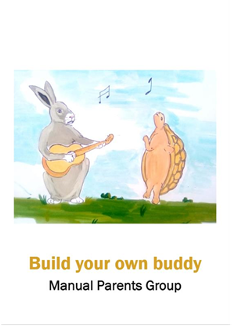Due to conflict and other harsh circumstances, people suffer, both physically and psychologically. On top of daily stressors, they have to deal with types of stress and traumatic events. This is not easy for adults, leave alone for children. For young children, it is hard to understand what happened/happens, why adults are fighting and why their parents are scared too.
Therefore, Help Child, TNO and ARQ started a project for children age 5 to 7 years and their parents/caretakers in South Sudan, in Wau and surrounding places, where the active fighting has come to a halt, but people still suffer from the consequences of the prolonged conflict. Build your Own Buddy is a Mental Health and psychosocial support (MH-PSS) group program with elements of Cognitive Behavioural Therapy (CBT) and Emotion Focused Therapy (EFT). Based on recent scientific insights, the program offers physical and mental strategies to recognise emotions, recognise and communicate about levels of stress and actively bring stress levels down.
During 11 sessions children hear about Bob, the hare. In the colourful storybook, Bob experiences all kinds of adventures. The volcano in the story is a metaphor for how children feel: very relaxed at the bottom, and very angry when they feel they are on top of the volcano. Through several exercises, children learn about different strategies to go down again to the relaxing fields at the bottom of the volcano. They get help from their buddy, who can help them to process all things that happen around them and it helps them to seek the support of adults.
Parallel to the sessions of the children, the parents/caretakers are taken through parenting sessions. With the use of psycho-education, they learn about their own stress and behaviour and they also read the story of Bob. In that way, they are able to help their children dealing with the stresses around them in a positive way.
Update: Community Counsellors have been trained by ARQ in Basic Mental Health skills and TNO in conducting the BoB sessions for children and parents. Two rounds of sessions have been finalised in 3 locations: Abunybuny, Agok and Mapel. Learning takes place through pre-and post-assessment questionnaires for the parents, session reports, focus group discussions with parents and FGDs with the community counsellors themselves.
Analysis of the results is being done at the moment, but so far it seems both children and parents like the program very much and learn a lot. For instance, a woman of one of the groups shared that she never realised that what she experienced during the conflict influenced the way she was treating her children, but in fact, she was holding a lot of anger in her. When sharing this in the parents’ group, she felt relieved. She now feels more love for her children and the possibility to care for them.
Learning Questions:
Viability and feasibility
Effects
For further implementation or up scaling

Save the Children
Laan van Nieuw Oost-Indië 131-k
2593 BM Den Haag
The Netherlands
Chair organisation: Plan International
E: office@dutchrelief.org